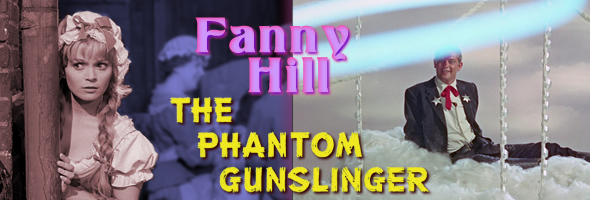
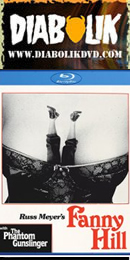

FANNY HILL
B&W, 1964, 104m.
Directed by Russ Meyer
Starring Leticia Roman, Miriam Hopkins, Ulli Lommel, Chris Howland, Helmut WeissTHE PHANTOM GUNSLINGER
Color, 1967, 99m.
Directed by Albert Zugsmith
Starring Troy Donahue,
Sabrina, Elizabeth Campbell, Emilio Fernandez, German Robles, Carlos Rivas, Pedro Armendariz Jr.
Vinegar Syndrome (Blu-ray & DVD) (US R0 HD/NTSC) / WS (1.85:1) (16:9)
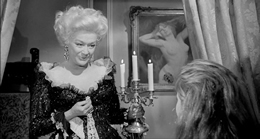
Usually credited with launching the nudie cutie craze of the 1960s,
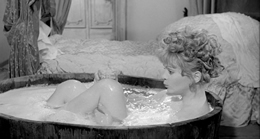 director Russ Meyer remains one of the most important and influential figures in the history of exploitation cinema. However, while it's easy to look at his overall career as a remarkable journey from silly T&A comedies to roughies, with a bizarre tangent through Hollywood leading to a charmingly excessive final stretch in the 1970s. However, you'll also find some odd speed bumps along the way, and none are stranger than Fanny Hill, a German-shot adaptation of the infamous John Cleland novel originally published as Memoirs of a Woman of Pleasure. Originally published in the 1740s, the novel was still a hot potato with obscenity prosecutions galore still in progress when this film went before the cameras. Meyer would seem to be an appropriate choice to tackle a project filled with heaving bosoms and bawdy sexuality, but he was publicly frustrated with the presence of producer Albert Zugsmith, whose past Hollywood glories included films like Touch of Evil and The Tarnished Angels. The two clashed over the tone of the film right from the beginning, with Zugsmith envisioning a knockabout bedroom comedy while Meyer wanted a major costume sex picture. Eventually Meyer was booted off the project, with Zugsmith wrapping it up and integrating his own "uproarious" touches like a silly cross dressing sequence and references to silent comedy.
director Russ Meyer remains one of the most important and influential figures in the history of exploitation cinema. However, while it's easy to look at his overall career as a remarkable journey from silly T&A comedies to roughies, with a bizarre tangent through Hollywood leading to a charmingly excessive final stretch in the 1970s. However, you'll also find some odd speed bumps along the way, and none are stranger than Fanny Hill, a German-shot adaptation of the infamous John Cleland novel originally published as Memoirs of a Woman of Pleasure. Originally published in the 1740s, the novel was still a hot potato with obscenity prosecutions galore still in progress when this film went before the cameras. Meyer would seem to be an appropriate choice to tackle a project filled with heaving bosoms and bawdy sexuality, but he was publicly frustrated with the presence of producer Albert Zugsmith, whose past Hollywood glories included films like Touch of Evil and The Tarnished Angels. The two clashed over the tone of the film right from the beginning, with Zugsmith envisioning a knockabout bedroom comedy while Meyer wanted a major costume sex picture. Eventually Meyer was booted off the project, with Zugsmith wrapping it up and integrating his own "uproarious" touches like a silly cross dressing sequence and references to silent comedy. For the uninitiated, the story revolves around the misadventures of Fanny Hill (Roman, the amateur sleuth from Mario Bava's The Girl Who Knew Too Much), a young girl out on her own looking
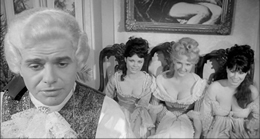 for work in 18th-century London. She finds an opportunity to deliver hats for an older lady named Mrs. Brown (Hopkins), who's actually planning to initiate Fanny into the working girls at her swanky brothel. Dumb as a post, Fanny can't figure out that all these so-called cousins are actually prostitutes and manages to evade every single planned client, instead falling for a guy named Charles (future Fassbinder colleague and schlock film auteur
for work in 18th-century London. She finds an opportunity to deliver hats for an older lady named Mrs. Brown (Hopkins), who's actually planning to initiate Fanny into the working girls at her swanky brothel. Dumb as a post, Fanny can't figure out that all these so-called cousins are actually prostitutes and manages to evade every single planned client, instead falling for a guy named Charles (future Fassbinder colleague and schlock film auteur 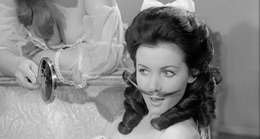 Lommel) and dodging the amorous advances of her coworkers.
Lommel) and dodging the amorous advances of her coworkers. Very clearly inspired by the randy, Oscar-winning antics of 1963's Tom Jones, this film turned out far more like the work of Zugsmith, who was itching to become better known as a director himself after his recent success helming low budget drive-in staples like College Confidential, Sex Kittens Go To College, and Confessions of an Opium Eater. Despite the production issues and the fact that neither man seemed terribly enamored with this film, it turned out to be a respectable hit and triggered several imitators including David F. Friedman's much naughtier The Notorious Daughter of Fanny Hill, a mod Swedish version from Mac Ahlberg in 1968, and a really odd 1983 British version with Oliver Reed and Shelley Winters. Strangely, Meyer's version is actually the tamest of them all with zero actual nudity to be found and very little in the way of titillation; the director had already shot the more typical Lorna at this time, but it hadn't been released to kick his career back in gear. In fact, it wasn't until his brilliant Faster, Pussycat! Kill! Kill! that Meyer really learned how to craft a crowd pleaser without any skin, making Fanny Hill a fascinating case study in his earlier attempts to maneuver out of the template he'd created for himself with The Immoral Mr. Teas. Meanwhile Zugsmith decided to continue down the literary route with
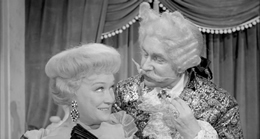 perhaps his strangest film, a 1966 version of the famous psychological tome Psychopathia Sexualis (released more famously under the title On Her Bed of Roses).
perhaps his strangest film, a 1966 version of the famous psychological tome Psychopathia Sexualis (released more famously under the title On Her Bed of Roses). Seen today, Fanny Hill is also an ironic example of how a filmmaker relinquishing control can also allow his film to survive. Meyer famously retained ownership of almost all of his films apart from this one and the pair of films he made for Fox, Beyond the Valley of the Dolls and The Seven Minutes. That worked well during the VHS era when he could release everything himself and reap all of the profits, but his failure to ensure the survival of his legacy in his waning years meant that the same dated masters were used for subpar DVD releases. Now after his death, his library has been left in very dubious hands; you can read more about the whole sorry saga elsewhere. That means that Fanny Hill, a film without an official video release
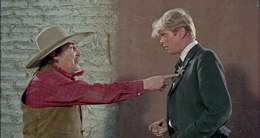 since its early VHS edition from Paragon, gets to be the first Meyer film out of the gate on Blu-ray courtesy of Vinegar Syndrome, who have packaged it as a three-disc release that also functions as a salute of sorts to Zugsmith, too. The transfer from the original negative looks impeccable, not surprisingly, giving the film a glossy sheen missing entirely from the old transfer. It's very bright and over lit in the usual Zugsmith style, but that also means that every scene is sharp as a tack, especially on the Blu-ray version.
since its early VHS edition from Paragon, gets to be the first Meyer film out of the gate on Blu-ray courtesy of Vinegar Syndrome, who have packaged it as a three-disc release that also functions as a salute of sorts to Zugsmith, too. The transfer from the original negative looks impeccable, not surprisingly, giving the film a glossy sheen missing entirely from the old transfer. It's very bright and over lit in the usual Zugsmith style, but that also means that every scene is sharp as a tack, especially on the Blu-ray version. If that weren't enough, this is also a
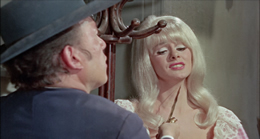 double feature paired up with a really strange rarity, Zugsmith's 1970 comedy/western/fantasy The Phantom Gunslinger. The late Troy Donahue, who shot this back to back with the wild The Love Thrill Murders, stars as Phil, a seminary student recently arrived in the dusty town of Yucca Flats ("the friendly metropolis now past 52 population including Indians, dogs and cats"). As usual, a bunch of bad guys led by the evil, hungry Big Sam (Rivas) are terrorizing everyone and robbing left and right. The current sheriff has had enough and turns his badge over to Phil, who can't fire a gun and prefers to duel with Bible quotes. That doesn't help out in a saloon fight though, and after a string of broad comedic face offs, Phil decides to get married to blonde sweetheart Margie (Satan in High Heels' Sabrina). However, even that doesn't turn out as planned when Phil gets gunned down from the church clock tower. Normally that would be a spoiler, but we're only halfway into the film and it's called The Phantom Gunslinger... so that means it's up to heaven for Phil, who gets another chance to find justice by coming back to life in his coffin. From there it's back and forth between heaven and earth as our nervous hero stumbles to his destiny.
double feature paired up with a really strange rarity, Zugsmith's 1970 comedy/western/fantasy The Phantom Gunslinger. The late Troy Donahue, who shot this back to back with the wild The Love Thrill Murders, stars as Phil, a seminary student recently arrived in the dusty town of Yucca Flats ("the friendly metropolis now past 52 population including Indians, dogs and cats"). As usual, a bunch of bad guys led by the evil, hungry Big Sam (Rivas) are terrorizing everyone and robbing left and right. The current sheriff has had enough and turns his badge over to Phil, who can't fire a gun and prefers to duel with Bible quotes. That doesn't help out in a saloon fight though, and after a string of broad comedic face offs, Phil decides to get married to blonde sweetheart Margie (Satan in High Heels' Sabrina). However, even that doesn't turn out as planned when Phil gets gunned down from the church clock tower. Normally that would be a spoiler, but we're only halfway into the film and it's called The Phantom Gunslinger... so that means it's up to heaven for Phil, who gets another chance to find justice by coming back to life in his coffin. From there it's back and forth between heaven and earth as our nervous hero stumbles to his destiny. 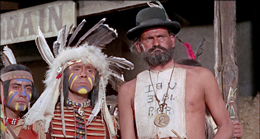
Very, very weird, this film plays like a vaudeville act stretched out to movie length with weird touches like greedy Native Americans, spring-loaded suits of armor, incoherent voiceovers, and opening credits featuring the cast and crew sitting with their equipment waiting to get started. Perhaps most surprisingly, this was shot by Gabriel Figueroa, cinematographer on several Luis Buñuel films, who shot this the same year he worked on Kelly's Heroes and Two Mules for Sister Sara! Well, everyone's gotta make a living.
As with the first film, The Phantom Gunslinger (which doesn't seem to have been officially released on video before) comes to Blu-ray looking great; apart from the opening credits (whose opticals cause it to look a generation or two lower in quality), the negative's pristine and outclasses many studio releases in terms of appearance. Two DVDs are included, too; the first has Fanny Hill by itself, no frills, while the second contains The Phantom Gunslinger and a pair of bonus features. The first is the 11-minute "The Zugsmith Collection," with Lommel (hanging out on a playground) recalling how he got the part in Fanny Hill thanks to his pretty good English. His memories of Meyer and Zugsmith jibe with historical accounts, but more surprising is his tale about how Zugsmith landed John Carradine for Lommel's biggest hit as a director, The Boogeyman. He also has some hilariously candid comments about Roman, whom he claims fretted about her age and kept claiming she was menstruating to get out of shooting her love scenes. Next up is a 20-minute piece with adult film scholar Eric Schaefer about Meyer's and Zugsmith's careers, ranging from the start of the nudie cutie explosion to the source novel's infamous history and placement among other scandalous novels in vogue at the time. Once again, a wild and unexpected slice of exploitation cinema history rescued for the digital age; you know you need this one.
Reviewed on December 1, 2013.
![]()